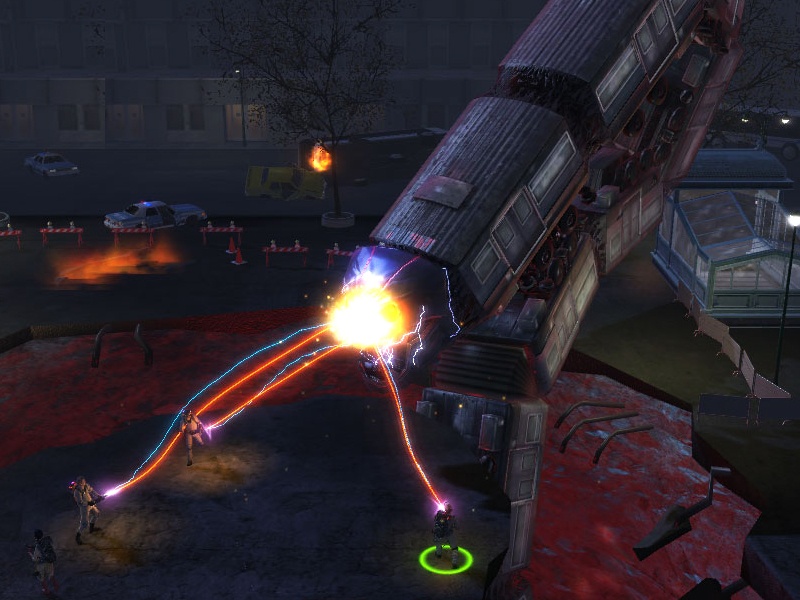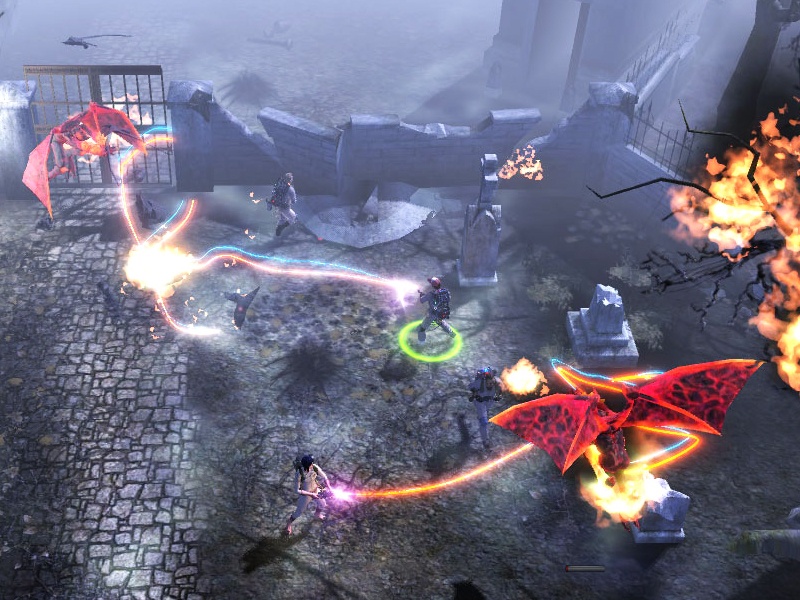The first rule of Ghostbusters is that you don't cross the streams. The second rule of Ghostbusters should be that any respectable game based on the franchise must always let you play the lovable quartet of Egon, Ray, Peter, and Winston. Ghostbusters: Sanctum of Slime manages to break both of these rules, all while forsaking the little touches that make similar top-down, twin-stick games so entertaining. It's possible to find some fun in Sanctum's four-player cooperative mode, but the combined frights of lackluster gameplay, recycled environments, and obtuse AI may scare away even the most devoted aspiring Ghostbusters.
The story, such as it is, centers on four rookie Ghostbusters who got their jobs only because the "senior team" overextended itself after a recent spike in paranormal activity. A series of cringe-worthy comic-book-style cinematics in the offline mode explain the reasons for the increase (if you've seen both of the movies, then you can probably already guess), and longtime fans might enjoy learning that the mad curator Janosz Poha still has a world-rending crush on Dana Barrett after 22 years. Yet, far from being memorable, the new recruits take so heavily after their employers that they seem like substandard carbon copies. For instance, the bespectacled brainiac Egon finds his spiritual clone in the like-minded Gabriel, and Ray Stantz's wide-eyed wonder finds its counterpart in the musings of the towheaded Samuel. The parallels are always painfully obvious, and they inevitably make you wonder why these guys are in the game in place of the real crew.

The gameplay doesn't help matters much, and the game quickly settles into a mind-numbing routine after a brief flash of promise. You prod your rookie about with your controller's left stick, and you maintain a constant stream of attack by holding down the right. If you're playing on a PC, then you simply drag your mouse in the direction of your foes. In a nod to variety, you're supplied with three different types of weapons designed for enemies of particular colors. You have, of course, your trusty proton blaster, which is best used on red enemies, but you also pack a scattershot weapon for blasting yellow ghosts and a blue-based attack that gains power if you bounce the projectile off the wall. And, yes, you can cross the streams.
Most of the game's fun comes from shifting between the three weapons during a battle, but the gimmick's meager novelty wears thin by the fourth of the game's 12 levels. Aside from boss battles and a periodic on-rails segment where you zap ghosts from the roof of the Ecto-4WD vehicle, Sanctum's battles unfailingly involve the rookies walking into an area, having a gate or door lock behind them, and then needing to defeat all of the ghosts that appear in order to open an exit. This in itself wouldn't be too bad if all of the maps didn't repeat themselves later in the campaign with the simple addition of harder enemies. And when you consider that your three weapons occasionally seem to have no effect on an enemy even when you use the proper color, jumping into these recycled encounters can seem unfairly challenging.
Convince up to three friends to play in place of the AI, however, and Sanctum becomes relatively enjoyable. On consoles, you can play cooperatively either locally or online, but on the PC only local play is supported. Since most enemies can knock you out of battle with only a couple of hits, though, you might spend a good deal of time rushing over to your fallen comrades and tapping buttons to pull them back into combat. It's not always as easy as it sounds: The PlayStation 3 and PC games are responsive enough, but the Xbox version occasionally fails to give you the revive prompt no matter how you position yourself.

Sadly, given the lack of online play, Sanctum's AI stands as one of the game's great weaknesses. While AI companions are much faster than real players when it comes to reviving fallen comrades, they exhibit an infuriating habit of running around in circles at the worst of times and often fail to use the proper weapons against ghosts of a particular color. Should you fall, they rush to your aid even when doing so means obvious death for them as well, and occasionally some streak of buggy pacifism keeps them from firing at all. This is particularly exasperating during boss battles while playing in single-player. Since most of these require keeping away from the boss and whittling down its hit points with a steady stream of proton juice, the process can take eons if the AI players aren't pulling their weight.
Ghostbusters: Sanctum of Slime imparts very little of the charm that the franchise is known for. There are no comical voice-overs; instead, little snippets of pop-up text with forced jokes suffice for character interaction. There are no puzzles to break the monotony of combat; the only break stems from the collection of Stay Puft Marshmallow Man dolls scattered throughout most levels. The music is appropriately eerie though a little repetitive, but thankfully the famous theme song plays while you visit the title screen. Perhaps including the real Ghostbusters could have made up for these shortcomings a bit, but on the whole, the thought of spending too much time with Sanctum of Slime is far more haunting than any ghost it throws at you.